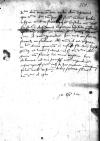List #1366
Mauritius FERBER do Ioannes DANTISCUS[Elbing (Elbląg)], [1535-10-23]
| odebrano Elbing (Elbląg), [1535]-10-23 Rękopiśmienne podstawy źródłowe:
Pomocnicze podstawy źródłowe:
Publikacje:
| ||||||||
Tekst + aparat krytyczny + komentarzZwykły tekstTekst + komentarzTekst + aparat krytyczny
Reverendissimo domino meo,
Reverendissime domine.
Monent me verba domini capitanei, quae Reverendissimae Dominationi Vestrae per suum nuntium hodie vesperi nuntiare fecit, quod cum


 AAWO, AB, D. 8, f. 101v
AAWO, AB, D. 8, f. 101v